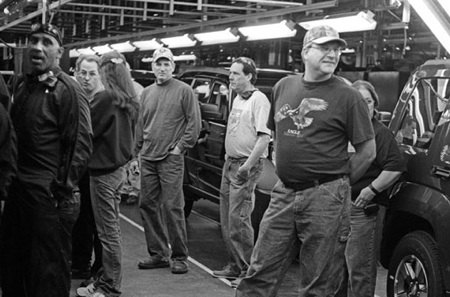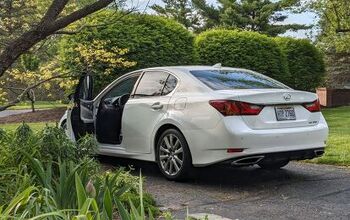Editorial: Chrysler Suicide Watch 48: Die Another Day
Barack Obama is set to address the nation tomorrow, announcing Chrysler’s death and rebirth. The president will frame the government’s intervention in familiar terms: hope and change. Only in the reverse order: change and hope. Obama will say that the federal government is helping Chrysler transform into a viable American automaker. This we (yes we) are doing because President Obama has hope for the future of the American automaker and, not-so-incidentally, American automaking. Chrysler, the United Auto Workers (UAW) and Fiat will now build the kind of economical, environmentally friendly vehicles America needs. Unfortunately, Obama’s “plan” is the exact opposite of what it pretends to be.
Chrysler Bailout III represents the protection and perpetuation of the status quo, not genuine change. How could anyone think otherwise, now that The Presidential Task Force on Automobiles (PTFOA) has engineered a deal that gives the United Auto Workers a majority stake in the reconstituted Chrysler? If there’s any one group in the auto industry that has resisted change, that’s opposed root and branch reform, it’s the UAW.
Since the union’s inception, they’ve labored under an ever-expanding set of terms and conditions, that’s now thicker than “Gone with the Wind” and “War and Peace” combined. As you might imagine, none of these endlessly negotiated strictures, mandates, grievance procedures, benefits, entitlements, etc., were designed to engender manufacturing flexibility. They were designed to protect workers from change.
The UAW’s onerous contracts have bolstered a stultified corporate culture that’s both unable and unwilling to foster innovation. You want to change the way I do my job? Take it up with the union. And good luck with that.
Sure, Chrysler’s management bears ultimate responsibility for allowing their union workers to [help] frustrate the company’s overall competitiveness. And no, the UAW didn’t decide what Chrysler cars, trucks, SUVs and minivans to build, how to build them, what parts to use or how to put them together. But no matter who’s to blame for Chrysler’s execrable products, the union is in the business of protecting the union—not finding ways to build better automobiles.
Not to put too fine a point on it, anyone who truly believes that increasing the UAW’s stake in Chrysler will transform union members from legendary foot-draggers to world class sprinters, passing the four-wheeled baton to a freshly energized (Italian?) management structure with speed and grace, is nuts. As in delusional.
Which is a perfect description of President Obama’s “plan” for Chrysler.
Not to coin a phrase, Obama and his PTFOA have failed to hope but verify. It’s one thing to imagine a reborn Chrysler making fuel-efficient Fiats that can sell at enough of a profit to keep UAW members employed and pay off the new company’s $10 billion (and counting) debt to taxpayers. It’s another to think it can actually be done.
Chrysler’s turnaround “plan” involves more variables than a five day weather forecast, from mastering manufacturing logistics in a company decimated by layoffs, to somehow overcoming consumer resistance to TWO damaged brands.
Perhaps that’s why private investors wouldn’t touch Chrysler with a ten-foot spreadsheet. And now, where financial angels fear to tread, the federal government rushes in. To save jobs. Union jobs.
As I’ve stated previously, the American public doesn’t know credit default swaps from Shinola (another company that went the way of the buggy whip). But they understand that new Chrysler is a union gig. Well, if they didn’t before, they will now, what with the UAW’s 55 percent share of the post C11 company. The question then becomes how much sympathy does the average American—rather than, say, the average Democratic operative—have for the “plight” of the unionized working man?
The answer: some. But not enough. Not enough to go out and buy a new new Chrysler product just because it wears the union label. Especially not now, at a time when the average new car buyer isn’t buying a new car. When they can’t afford to risk their hard-earned money on a vehicle that may or may not be reliable. From a dealer that may or may not be in business next year. And then there are the people who will not even consider buying a Chrysler product because of the bailout.
There’s your bottom line. At the end of the day, after the feds “invest” tens of billions of tax dollars in Cerberus and Daimler’s cast-off, the automaker will live or die based on whether or not American consumers will buy the company’s vehicles in sufficient quantity at a price that allows Chrysler to take in more than they spend. As our Best and Brightest will tell you, without genuine change in corporate culture, without a realistic plan, the odds of that happening are somewhere between none and none.
And so the president will eventually learn—as Chrysler’s previous owners have—that commercial realities can only be postponed not denied.
More by Robert Farago
Latest Car Reviews
Read moreLatest Product Reviews
Read moreRecent Comments
- Jeff I have had about 6 recalls on my 2022 Maverick hybrid with most of them needing program updates other than that I really like my Maverick.
- Daniel J One thing to note: just because it's 240v doesn't mean the circuit can handle the load. How if a breaker trips and something important is on that breaker (lighting, sump pump... whatever). How if all the 240 receptacles are on the same circuit and two people charge at the same time?
- Redapple2 A slight twist of the topic. > A good reason to buy a car before they do a redesign (beyond teething problem for the newborns). Getting a car with the old tech. IE- vanishing Carplay. New subscription requirements. And doing away with switches and knobs and substituting a huge TV screen. I got a 2024 Forester because the 2025 moves everything to the new huge TV screen. A/C settings. Seat heat. All wheel drive modes etc. All in the TV screen. Some of it buried on page 3 of a submenu. No. Hard no. I m not participating in this.
- Lou_BC 2022 Colorado ZR2 diesel:1st year:I got a "low oil" warning the first few months of ownership. Dealer checked oil consumption every month for 6 months. No oil consumption. Probably incorrectly filled at factory and missed with PDI. AC did not work. Noticed that 2 weeks later during a hot spell. Local dealership lazy and just recharged system. They assumed GM factory screwed up. It leaked out and wasn't working after winter. Tech did a leak test and found problem. Sold without module that runs heated seats (chip shortage). I got a $50 refund and when parts showed up they inserted module. Repaired right before winter. DEF heater too weak to keep up with extended cold weather. ECU did threaten "limp mode". Dealer claims everything was working as designed. Multiple small dents in rear wheel wells close to plastic fender flares. Rock damage from driving on gravel roads. Factory wheel well liners are sh!t. GM spray in liner does not cover entire tailgate. Cheap bastards. 2nd year:DEF system froze up again. Service adviser said they sell more trucks in California than Canada. Get a heated garage. Rear brakes. Left rotor and pads fried at 50,000 km. Right side not quite to metal. I was told this was normal for Chevy trucks used offroad. Lost a rear shock guard. Poor design. Cheap. Diff vent line dislodged. Wheel design pretty but prone to rock chips and rock damage. Dented a rock slider on a big rock. Often find little pebbles in between plastic flares and metal fenders. Rear bumper seams also collect pebbles. Duratrac's are a decent all around tire but are too soft for extended time on gravel roads. Chewed up and very little tread at 60,000 km. Lost 1 tire to sidewall puncture. It definitely isn't as well built as my previous trucks. I seriously doubt I'd buy another Chevy. I like the truck overall. Love the diesel drivetrain.
- HotPotato Honestly VW should have bought Canoo too -- the Canoo is a much better rendition of a modern VW van than the actual VW EV van, which is just a standard generic Euro delivery van disguised by a vintage 2-tone paint job.


































Comments
Join the conversation
seanx37: "The tens of billions to upgrade the ancient and obsolete factories?" Sean, While I agree with your sentiments, it's untrue that Chrysler has obsolete factories. Chrysler has some of the most modern manufacturing plants anywhere. FIAT knows this. That's one reason they want in.